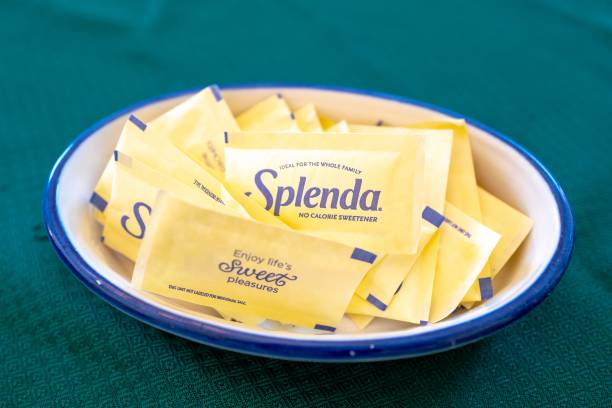Just because you have diabetes doesn’t mean you have to give up on your sweet tooth!
If you’re looking to add some extra punch to your dishes or drinks but don’t want the sugar spikes that come with it, you’re in luck. In the pursuit of healthier lifestyles, many individuals are seeking alternatives to traditional sugar to manage calorie intake and blood sugar levels.
When cravings for something sweet come on strong, know where to turn.
Here are six sweeteners, with their pros and cons, so you can make the best choice day in and day out…

1. Stevia
Derived from the leaves of the Stevia rebaudiana plant, stevia is a natural, zero-calorie sweetener that you’ve probably used or heard of. The best part of stevia is that it doesn’t spike blood sugar levels, making it especially suitable for diabetics. Studies have even shown that stevia acts like an antioxidant, helping to lower blood pressure and reduce inflammation.
Depending on the stevia product, it can be up to 300 times sweeter than sugar. Thanks to its compounds called steviol glycosides, the sweet receptors on your tongue have a field day!
Of course, there’s always a downside. Some stevia users are not fond of the bitter or licorice-like aftertaste. Also, if you are susceptible to bloating or nausea, stevia may not be the best choice.
2. Monk Fruit
Monk fruit sweetener is less known than stevia, but certainly just as useful and effective. It’s extracted from the monk fruit and contains something called mogrosides, which give you the sweet taste you want without all the unnecessary calories. Like stevia, it won’t jolt your blood sugar levels and can act as an antioxidant and anti-inflammatory.
Generally speaking, monk fruit is about 100-250 times sweeter than sugar.
The only real problem with monk fruit is that it’s not as easy to find as other alternative sweeteners. It’s also more expensive when you do find it, and it has a distinct taste that some people don’t like. In many cases, it’s actually blended with other sweeteners due to its cost and aftertaste.
To each their own!
RELATED: Sugar Vs. Sweetener Substitutes: The Good & Bad
3. Xylitol
A common sugar alcohol used to fight tooth decay, xylitol is also frequently found in sugar-free gum and dental products. It has roughly the same sweetness as sugar, with fewer calories than sugar and minimal impact on blood sugar levels.
Xylitol may just be the perfect choice for you.
Just be careful. Some research has linked overconsumption of xylitol to higher risks of heart attack and stroke. Additionally, some individuals notice digestive issues, especially when overusing it. And finally, be sure to keep it away from pets, as it’s toxic to dogs!
If you haven’t tried xylitol, take it easy at first, and ask your doctor about any concerns.
4. Erythritol
Similar to xylitol, erythritol is another sugar alcohol that contains about 0.24 calories per gram. In other words, significantly less than sugar. It’s also less sweet than sugar, but because it’s absorbed in the small intestine and excreted in urine, it’s better tolerated than other sugar alcohols.
As with all the sugar substitutes on this list, erythritol doesn’t raise blood sugar or insulin levels, making it potentially great for people with diabetes.
That said, erythritol may pose an increased risk of heart attack and stroke similar to that of xylitol. While the research is still emerging on this, it’s always a safe bet to moderate your use and ask your healthcare provider, particularly if you have a history of heart conditions.

5. Aspartame
Two hundred times sweeter than sugar, aspartame is pretty common these days, found across diet sodas and sugar-free products. Unlike the other sugar substitutes discussed, aspartame has the most research behind it. That makes it one of the most studied artificial sweeteners available.
Only one problem. The World Health Organization has actually classified aspartame as “possibly carcinogenic to humans,” referring to limited evidence linking its use to liver cancer. Other studies have even found an association between long-term aspartame use and neurological conditions.
As the studies continue, it’s important that you exercise caution when using aspartame. Given that it’s heavy in many ‘diet’ products, your best bet is to reduce these products. If you have a sweet tooth but need something with a low glycemic index, you can always incorporate certain fruits, such as dates, apples, bananas, berries, and raisins.
These options all have natural sweetness, won’t spike your blood sugar, and offer good fiber content as well!

6. Sucralose
Better known as Splenda, this sugar substitute stays sweet even when heated, making it a go-to when you’re doing some baking. A whopping 600 times sweeter than sugar, sucralose also doesn’t boost blood sugar, so it’s a solid option for diabetics who want a pastry or treat from time to time.
But here’s the rub. Some researchers find that Splenda can impact your gut bacteria negatively, thereby leading to insulin resistance and metabolic syndrome.
Clearly, more research is needed to determine the effects of sucralose on metabolic processes, because if it does have more negative impacts than positive impacts, it shouldn’t be consumed by people with diabetes!
RELATED: Soul Food and Sugar: 6 Delicious Substitutes for Black Diabetics
Finding The Right Sweetener
It may be hard to know which sugar substitute is right for you, so it’s worth trying them all. As always, use them sparingly at first and see how you like them and tolerate them. Although no one size fits all, in general terms, stevia and monk fruit lead the pack.
When used in their pure forms, these two alternative sweeteners can offer everything you like about sugar, without the harmful effects. Both are natural, have minimal impact on blood sugar levels, and provide additional health benefits.
Although other substitutes like xylitol and erythritol have their merits, recent studies raise concerns about their cardiovascular effects. Meanwhile, despite being widely used, artificial sweeteners like aspartame and sucralose come with potential health risks that warrant caution.
As always, moderation is key. Consult with your doctor to see which option is best for your body, your life, and your successful diabetes management!









